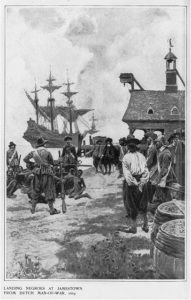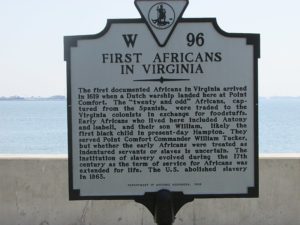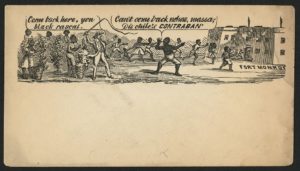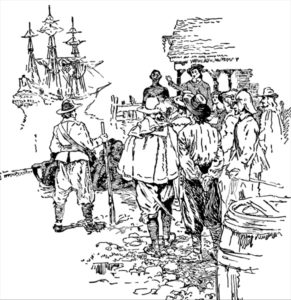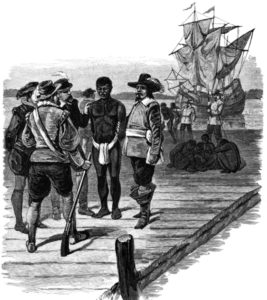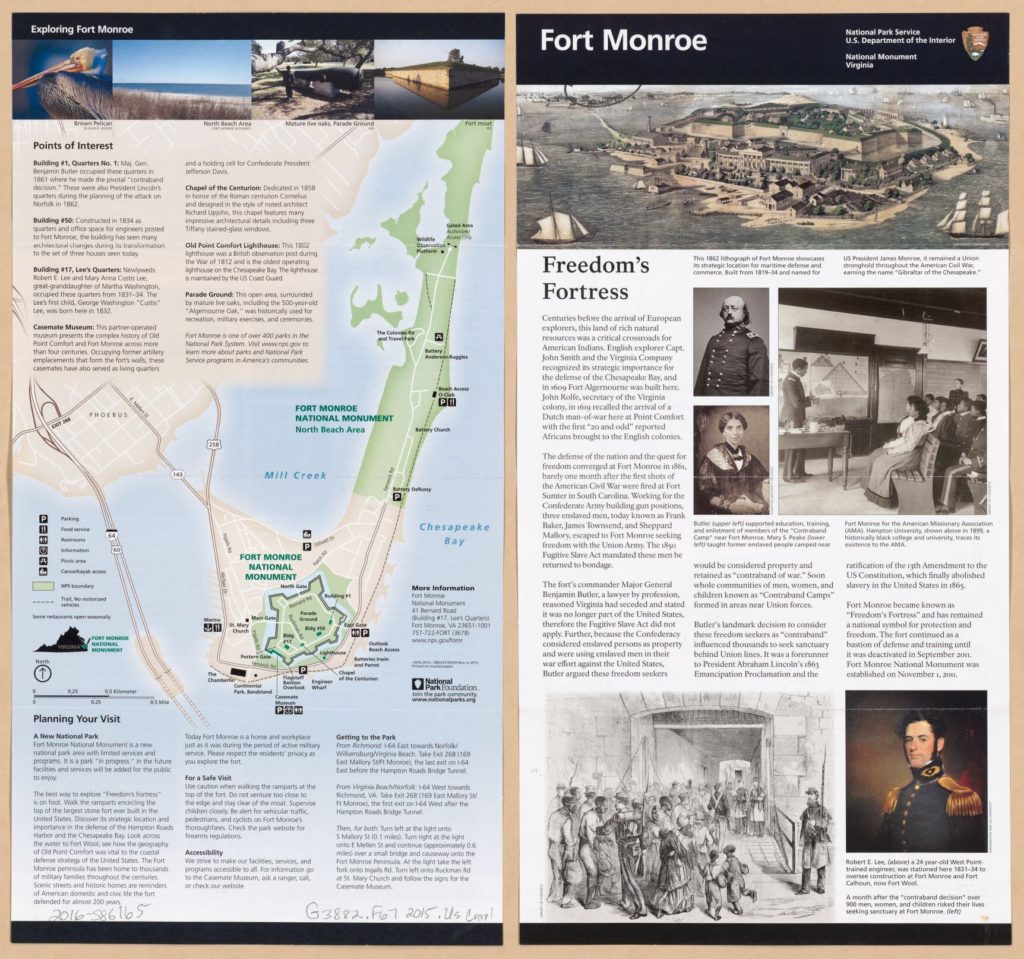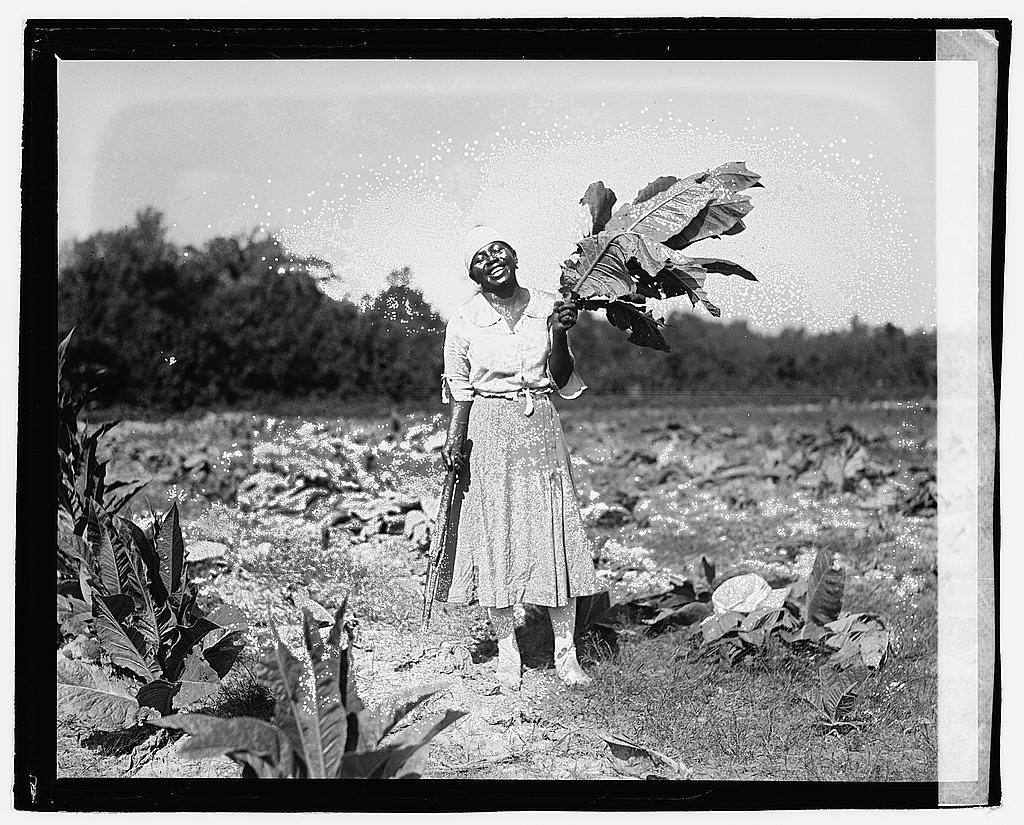400 years ago this month the first Africans arrived in the colony of Virginia in what is now the United States. According to Encyclopedia Virginia, in the summer of 1619 two English privateers, the White Lion and the Treasurer attacked the São João Bautista, a Portuguese ship, as it approached modern Mexico with its cargo of West African slaves. Each English ship stole some of the slaves. The White Lion’s “captain, John Colyn Jope, bore a Dutch letter of marque, paperwork that allowed him, as a civilian, to attack and plunder Spanish ships”. In late August the White Lion landed at Point Comfort in Virginia. According to the National Park Service (Historic Jamestowne), the Africans were bartered for food. John Rolfe, the colony’s Secretary, wrote: “About the latter end of August, a Dutch man of Warr of the burden of a 160 tunes arrived at Point-Comfort, the Comandors name Capt Jope, his Pilott for the West Indies one Mr Marmaduke an Englishman. … He brought not any thing but 20. and odd Negroes, w[hich] the Governo[r] and Cape Merchant bought for victuall[s].” The Park Service said that Mr. Rolfe referred to the White Lion as a Dutch ship to avoid anyone blaming the English for piracy.
The Park Service goes on to point out that the peculiar institution was unknown in Virginia at the time. Slavery evolved gradually from something like “indentured servitude to life long servitude.” A series of customs and laws that strengthened slavery are listed from
the 1630s to 1705. This process is summed up by The Jamestown Chronicles:
By the 1650s there were free people of color in the colony, but most did not do as well economically as free white Virginians. Although legal discrimination was evident by the late 17th century, Africans, such as Anthony Johnson, did prosper in Virginia. He owned land in Northampton County, had one servant, and owned one slave.
The first law recognizing the existence of slavery in Virginia was passed in 1661, and a law making it hereditary was passed the next year. As landowners created laws to control the labor they needed, institutionalized slavery gradually evolved from these laws and a “slave code” was produced by the General Assembly in 1705.
The Zinn Education Project notices some ironies with the 1619 landing: the landing was at Point Comfort, but life was anything but comfortable for the majority of African-Americans under slavery; “1619 also was the year that a semblance of democracy came to Virginia” when the first legislative assembly convened – the assembly included elected Burgesses; Fort Monroe on Point Comfort became a destination for slaves seeking their freedom during the Civil War – General Benjamin Butler declared the male slaves that showed up to be contraband of war, and he wasn’t going to give them back.
1619 was also the time when a group of English people living in Holland were planning to establish a colony in the New World where they would be free to practice their non-Anglican religion without losing other parts of English culture to Dutch influence.
A mid-nineteenth century historian from Virginia mentioned “the Pilgrims” in the same chapter he covered the 1619 landing at Point Comfort. He began by reviewing that first legislative assembly. He closed by mentioning another Virginia market for humans about the same time, but the women probably weren’t forced to get on the boat. From History of the Colony and Ancient Dominion of Virginia by Charles Campbell (1860) (at Project Gutenberg (pages 143-147):
Thus after eleven years of suffering, peril, discord, and tyranny, intermingled with romantic adventure, bold enterprise, the dignity of danger, virtuous fortitude, and generous heroism, were at length established a local legislature and a regular administration of right. The Virginia planters expressed their gratitude to the company, and begged them to reduce into a compend, with his majesty’s approbation, such of the laws of England as were applicable to Virginia, with suitable additions, “because it was not fit that his subjects should be governed by any other rules than such as received their influence from him.” The acts of the Assembly were transmitted to England for the approval of the treasurer and company. They were thought to have been very judiciously framed, but the company’s committee found them “exceeding intricate and full of labor.” There was granted to the old planters an exemption from all compulsive service to the colony, with a confirmation of their estates, which were to be holden as by English subjects.
It is remarkable, that from about 1614, for some seven years, James the First had governed England without a parliament; and the Virginia Company was during this period a rallying point for the friends of civil and religious freedom, and the colony enjoyed the privilege, denied to the mother country, of holding a legislative assembly.
Yeardley finding a scarcity of corn, undertook to promote the cultivation of it, and this year was blessed with abundant crops of grain. But an extraordinary mortality carried off not less than three hundred of the people. Three thousand acres of land were allotted to the governor, and twelve thousand to the company. The Margaret, of Bristol, arrived with some settlers, and “also many devout gifts.” The Trial brought a cargo of corn and cattle. The expenditure of the Virginia Company at this period, on account of the colony, was estimated at between four and five thousand pounds a year.
A body of English Puritans, persecuted on account of their nonconformity, had, in 1608, sought an asylum in Holland. In 1617 they conceived the design of removing to America, and in 1619 they obtained from the Virginia Company, by the influence of Sir Edward Sandys, the treasurer, “a large patent,” authorizing them to settle in Virginia. They embarked in the latter part of the year 1620, in the Mayflower, intending to settle somewhere near the Hudson River, which lay within the Virginia Company’s territory. The Pilgrims were, however, conducted to the bleak and barren coast of Massachusetts, where they landed on the twenty-second day of December, (new style,) 1620, on the rock of Plymouth. Thus, thirteen years after the settlement of Jamestown, was laid the foundation of the New England States. The place of their landing was beyond the limits of the Virginia Company.
In the month of August, 1619, a Dutch man-of-war visited Jamestown and sold the settlers twenty negroes, the first introduced into Virginia. Some time before this, Captain Argall sent out, at the expense of the Earl of Warwick, on a “filibustering” cruise to the West Indies, a ship called the Treasurer, manned “with the ablest men in the colony,” under an old commission from the Duke of Savoy against the Spanish dominions in the western hemisphere. She returned to Virginia after some ten months, with her booty, which consisted of captured negroes, who were not left in Virginia, because Captain Argall had gone back to England, but were put on the Earl of Warwick’s plantation in the Somer Islands.
It is probable that the planters who purchased the negroes from the Dutch man-of-war reasoned but little on the morality of the act, or if any scruples of conscience presented themselves, they could be readily silenced by reflecting that the negroes were heathens, descendants of Ham, and consigned by Divine appointment to perpetual bondage. The planters may, if they reasoned at all on the subject, have supposed that they were even performing a humane act in releasing these Africans from the noisome hold of the ship. They might well believe that the condition of the negro slave would be less degraded and wretched in Virginia than it had been in their native country. This first purchase was probably not looked upon as a matter of much consequence, and for several ages the increase of the blacks in Virginia was so inconsiderable as not to attract any special attention. The condition of the white servants of the colony, many of them convicts, was so abject, that men, accustomed to see their own race in bondage, could look with more indifference at the worse condition of the slaves.
The negroes purchased by the slavers on the coast of Africa were brought from the interior, convicts sold into slavery, children sold by heathen parents destitute of natural affection, kidnapped villagers, and captives taken in war, the greater part of them born in hereditary bondage. The circumstances under which they were consigned to the slave-ship evince the wretchedness of their condition in their native country, where they were the victims of idolatry, barbarism, and war. The negroes imported were usually between the ages of fourteen and thirty, two-thirds of them being males. The new negro, just transferred from the wilds of a distant continent, was indolent, ignorant of the modes and implements of labor, and of the language of his master, and perhaps of his fellow-laborers. To tame and domesticate, to instruct in the modes of industry, and to reduce to subordination and usefulness a barbarian, gross, obtuse, perverse, must have demanded persevering efforts and severe discipline.
While the cruel slave-trade was prompted by a remorseless cupidity, an inscrutable Providence turned the wickedness of men into the means of bringing about beneficent results. The system of slavery, doubtless, entailed many evils on slave and slave-holder, and, perhaps, the greater on the latter. These evils are the tax paid for the elevation of the negro from his aboriginal condition.
Among the vessels that came over to Virginia from England, about this time, is mentioned a bark of five tons. A fleet sent out by the Virginia Company brought over, in 1619, more than twelve hundred settlers. The planters at length enjoyed the blessings of property in the soil, and the society of women. The wives were sold to the colonists for one hundred and twenty pounds of tobacco, and it was ordered that this debt should have precedence of all others. The price of a wife afterwards became higher. The bishops in England, by the king’s orders, collected nearly fifteen hundred pounds to build a college or university at Henrico, intended in part for the education of Indian children.
In July, 1620, the population of the colony was estimated at four thousand. One hundred “disorderly persons” or convicts, sent over during the previous year by the king’s order, were employed as servants. For a brief interval the Virginia Company had enjoyed freedom of trade with the Low Countries, where they sold their tobacco; but in October, 1621, this was prohibited by an order in council; and from this time England claimed a monopoly of the trade of her plantations, and this principle was gradually adopted by all the European powers as they acquired transatlantic settlements.
The National Park Service at Fort Monroe is commemorating the First African Landing this weekend.

